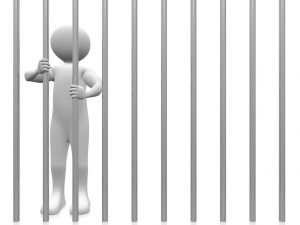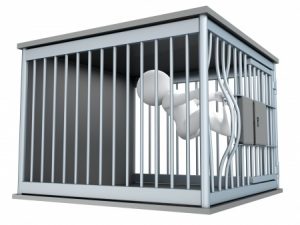
Ever wonder what happens when someone gets arrested? This page explains what the general procedure in Virginia for a typical criminal case.
The Arrest
When people are arrested, they’re seized by the police and taken into custody. Once arrested, they’re transported to a local police station and informed of the charge, or charges.
Booking
They’re then booked, which simply means an that an official record will be made with the facts about the arrest and charges, as well as the identification of the suspect. This includes having their picture taken, giving their full name, address and other relevant contact information, as well as get fingerprinted. During this process, personal property, including clothes, will be taken and stored to later be returned upon release. If any illegal items are found at the time the arrest was made, don’t expect them back as they won’t be returned.
The magistrate will then determine whether or not to issue a bond, and if so, the amount of the bond. Virginia Code § 19.2-121 lists the factors for determining bail, which are:
§ 19.2-121. Fixing terms of bail.
If the person is admitted to bail, the terms thereof shall be such as, in the judgment of any official granting or reconsidering the same, will be reasonably fixed to assure the appearance of the accused and to assure his good behavior pending trial. The judicial officer shall take into account (i) the nature and circumstances of the offense; (ii) whether a firearm is alleged to have been used in the offense; (iii) the weight of the evidence; (iv) the financial resources of the accused or juvenile and his ability to pay bond; (v) the character of the accused or juvenile including his family ties, employment or involvement in education; (vi) his length of residence in the community; (vii) his record of convictions; (viii) his appearance at court proceedings or flight to avoid prosecution or failure to appear at court proceedings; (ix) whether the person is likely to obstruct or attempt to obstruct justice, or threaten, injure, or intimidate, or attempt to threaten, injure, or intimidate a prospective witness, juror, or victim; and (x) any other information available which the court considers relevant to the determination of whether the accused or juvenile is unlikely to appear for court proceedings.
In any case where the accused has appeared and otherwise met the conditions of bail, no bond therefor shall be used to satisfy fines and costs unless agreed to by the person who posted such bond.
If a secured bond is issued, a bondsman may be required to get through the bail bond process. Until someone posts the bail bond, the suspect will be required to remain in jail until the trial date.
Be aware that defendants won’t be released until they’re sober if the charge is alcohol related.
Arraignment
The first court date will be the arraignment, which is typically held in the General District or Juvenile Domestic Court. Charges are formally read to the defendant. The defendant is asked to enter a plea of guilty, not guilty, or no contest (nolo contendere). A plea of “no contest” means admitting to the facts of the case, but not the guilt. A benefit of a “no contest” plea is it can prevent having a guilty plea being used against the defendant later, perhaps in a civil case. It’s also often used as a plea bargain.
The next court date depends on the type of charges.
For most misdemeanor charges, the next court date will be a trail date. For DUI and other drug cases, the next court date will pertain to hearing the evidence regarding any blood tests, breath tests, and other evidence of the like.
For a felony charges, there will be a preliminary hearing and then a Grand Jury hearing.
General District and Circuit Courts
Misdemeanor cases, as well as preliminary hearings for felony cases, are heard in General District Courts. All cases are heard by a judge and never a jury in a General District Court.
The Circuit Court has jurisdiction for felony criminal cases and some juvenile felony cases.

Preliminary Hearing
The preliminary hearing is to determine if there’s enough probable cause against the accused to have the case go forward to a grand jury.
The Grand Jury
The grand jury will determine if the case should go to trial. It hears evidence presented by the Commonwealth’s attorney which shows the accused committed the crime(s) he or she is charged with. The grand jury will then decide if there’s probable cause to issue an indictment against the accused. An indictment is simply a formal document charging the defendant with the crime.
Indictments are issued in the majority of cases heard by the grand jury. Once issued, the cases go to a jury trial.
Misdemeanor Trial
Trials for misdemeanor offenses are typically heard in a General District Court. There’s no jury; judge hears the evidence and rules on the case.
Felony Trials
With the input of an attorney, a jury is selected. This is referred to as voir dire. Once the jury is decided on, the Commonwealth’s attorney and the defense attorney give “opening statements” to the jury. Then the trial actually begins. The prosecution presents it case, introduces evidence, and witnesses testify. When the prosecution completes it’s case, the defense may introduce its own evidence. The jury then convenes and decides on the case.
Call Aarrow Bail Bonds at 804-833-2785 for all your bail bonding needs. We serve bonds in Richmond, Henrico, Chesterfield, Hanover, and all over Virginia. And we’re open 24/7 for your convenience.
